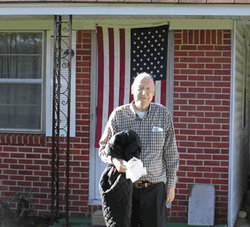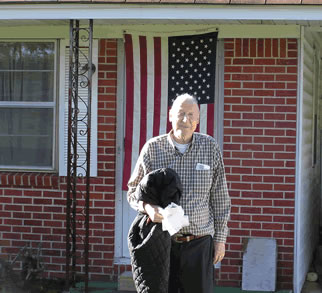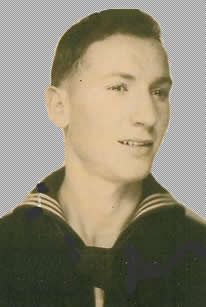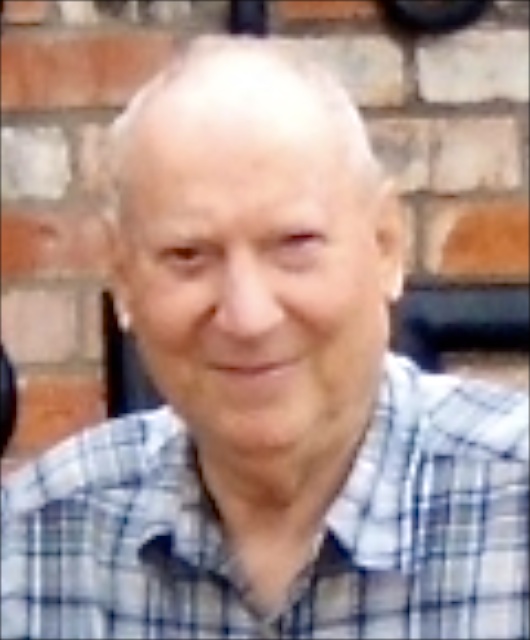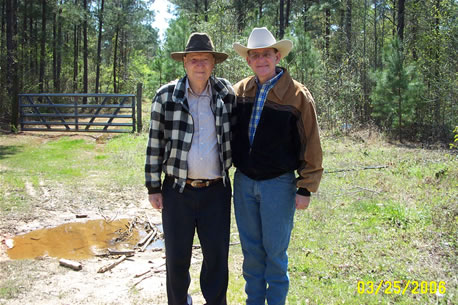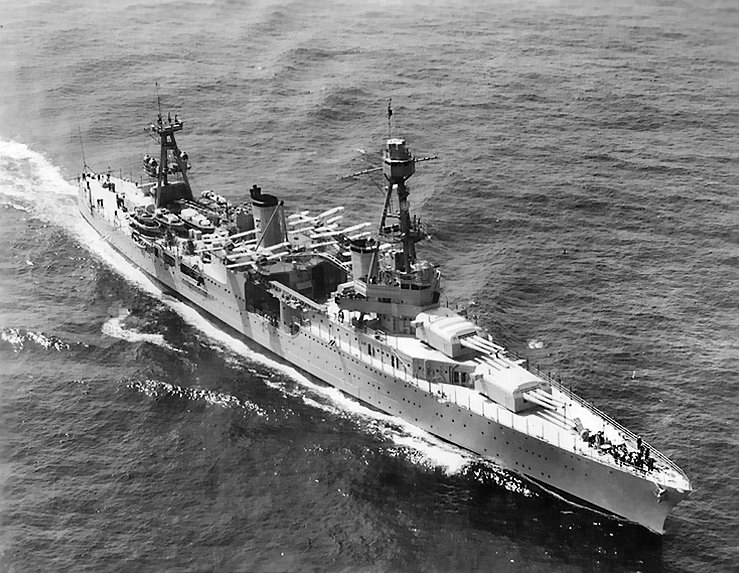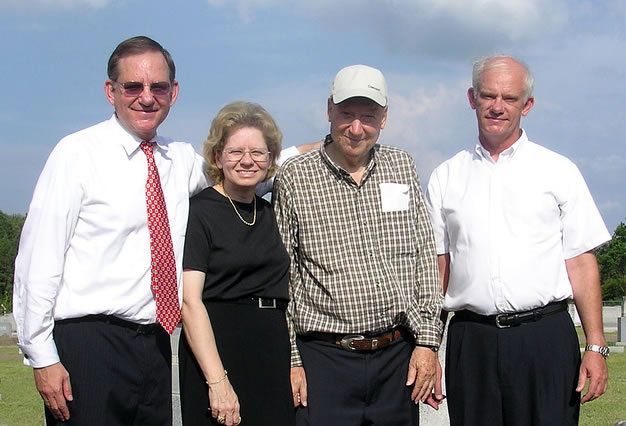Mr. James Monroe Sims, age 92, of Arcadia, Louisiana, went to be with the Lord, peacefully on Saturday, February 25, 2012 at 4:45 p.m. at his home.
Born February 1, 1920, in Arcadia, Bienville Parish, Louisiana, James was the third son of Reuben Douglas (R. D.) Sims, Sr. and Effie May Lawley Sims. He was named for his grandfather, James Monroe Sims, the founder of Simsboro.
After graduating from Arcadia High School, James attended Louisiana Tech until enlisting in the U. S. Navy in 1940. James proudly served in the Navy for six years during World War II and was a survivor of the cruiser U.S.S. Chicago during the Guadalcanal Campaign. His ship was sunk by enemy bombers and torpedo planes off the Solomon Islands on January 30, 1943. He then served in the Pacific during the remainder of World War II.
After returning from the war, James attended and graduated from the College of Mortuary Science in St. Louis, Missouri. He worked for Hixson Brothers Funeral Home in Alexandria, La., Mulhearn Funeral Home in Monroe, La, and Kilpatrick's Funeral Home in Ruston, La. until returning home to Arcadia in 1951 afer his father's death. Since that time he has been an independent appraiser and dealer in land and timber in Jackson, Lincoln and Bienville Parishes in Louisiana and in several East Texas counties.
James was a well-learned, soft spoken man -- a kind and gentle person who loved the Lord. He loved his hometown and remembered much about its colorful history, especially the excitement he witnessed as a teenager after the Bonnie and Clyde ambush. As a young boy, he enjoyed going with his father to attend Huey P. Long election rallies. We will miss our talks when James would paint for us a picture of growing up in Arcadia and all the people he had known and loved throughout the years.
James was a member of First Baptist Church, Arcadia, having been baptized there on June 17, 1932. He was also a member of the American Legion Post 70 and the Hospitalized Veterans Association. In addition, he was a member and served for many years as the secretary of the Guadalcanal Campaign Veterans Association.
He was preceded in death by his parents and two brothers, William Sims and R. D. Sims, Jr.
He is survived by a nephew, Bill Sims, wife Kathy, and their children: Greg and wife Christine of Shreveport; Drew, wife Jessica, and their sons Case and Luke of Arcadia; Brooke Langford, husband Kevin, and son Reuben Baker of Arcadia. In addition, he is survived by cousins: Pauline Phillips Tabor of Jefferson, Texas; Dr. Jim Moshinskie of Waco, Texas; Charles Moshinskie and wife Barbara of Hot Springs, Arkansas; Gloria Echols (niece of Effie Sims) and her husband John of Shreveport, Louisiana; Arnita Phillips Carnahan of Cummings, Ga.; and close longtime friends and neighbors, Ted and Patsy Stringer of Arcadia and their children: Jennifer Hartdegen, husband Vernon, and children: Zach, Raegan, Ryan and Kendyl of Collierville, Tennessee; and Cary Stringer of Nashville, Tennessee.
A special heartfelt ‘thank you' is extended to Alberta Roberson, Jessie Holland, Magnolia Home Health, Arcadia, and Hospice of Caring Hearts, Ruston, for their concern and faithful care during James' sickness.
Visitation was 1:00 p.m. on Thursday, March 1, at Rose-Neath Funeral Home Chapel in Arcadia followed by a funeral service at 2:00 p.m. Rev. Jeff Hoffman and Dr. Jim Moshinskie will officiate, and Ted Stringer sang "How Great Thou Art".
Interment with Naval military honors next to his brother, R.D. Sims Jr., followed at the Arcadia Cemetery under the direction of Rose-Neath Funeral Home.
Gary Carlisle, Kevin Langford, Drew Sims, Greg Sims, Jonathan Stewart and Cary Stringer will serve as pallbearers.
In lieu of flowers, memorials may be sent to the charity of your choice or to Hospitalized Veterans Association, P. O. Box 758505, Topeka, Kansas, 66675.
You may sign an online Guest Book at www.rose-neath.com
EULOGY GIVEN BY DR. JIM MOSHINSKIE AT THE FUNERAL:
Hello, my name is Dr. Jim Moshinskie from Waco Texas where I teach at Baylor University and operate several funeral homes in Central Texas. My mother, Louise Phillips, came from Simsboro so I know this area well and have been always enchanted by it.
I have known Mr. James Monroe Sims for over 35 years, and because of our common interests in politics, area history, land management, Sims family lore, and the funeral business, we were best buddies.
His father Ruben Douglas Sims and my great-grandmother Mattie Lee Sims Phillips were brother and sister, and while the bloodline between him and I was water-downed, we still fondly and lovingly called each other "cousin" and enjoyed our times together.
James asked me several years ago to speak at his funeral – and while I am sad that we have to gather here today, I am honored I have a chance to eulogize a man I loved so much.
I liked conversations with James: He respected people and listened intently, looking you in the face and not fidgeting with a cell phone. Whenever I said something profound that grabbed his attention, he would always proclaim, "Well I declare." When I heard this, I knew I was making progress.
As I soon learned, James cherished his lineage and traditions. He was born February 1, 1920 in Arcadia to Rueben Douglas and Effie Nay Lawley Sims. They named him after his grandfather, Mr. James Monroe Sims, the founder of nearby Simsboro.
So in respect, I have brought the Bible purchased by James Monroe Sims in 1845 for $4, that would be inflated to $235 now. This 167-year-old book was where the Sims family recorded births and deaths of the Sims family, their servants, and their mules in addition to bringing the Good News of God into their hilltop home. Today, I want to read a particular passage out of this Bible – from the Old Testament, written in what we now called the King James Version. It is from the 103 Psalm:
As for man, his days are like grass;
As a flower of the field, so he flourishes.
16 For the wind passes over it, and it is gone,
And its place remembers it no more.[a]
17 But the mercy of the LORD is from everlasting to everlasting
On those who fear Him,
And His righteousness to children's children,
18 To such as keep His covenant,
And to those who remember His commandments to do them.
In 1926 -- Six years after our James Monroe Sims was born -- a young Atlanta journalist named Margaret Mitchell began writing her one and only novel. The topic was the Old South before, during, and after the Civil War. When it came time to choose a title for the novel, she found a passage in the 103rd Psalm that described the theme of her book.
Let me re-read I passages that struck her, this time paraphrased in modern English:
The life of man is like green grass, it flourishes like a flower in the field, The wind blows over it and it is gone and its place remembers him now more. But everlasting to everlasting, the Lord's love is with those who fear him.
She transposed the words within this verse, and cleverly came up with the title of her novel, "Gone With The Wind" – a book with sales second only to the Bible itself.
But she also knew that the second part of the passage really told the story: God will forever remember those who love him faithfully. From this rises one of the most used phrases used on tombstones today: Gone but not forgotten.
James Sims loved Gone With The Wind and it subsequent movie; He frequently visited the Gone with the Wind museum in Jefferson, Texas where his cousin Polly Tabor, who is also my aunt, lives. You see James had to love Gone with the Wind: it was about him.
James Monroe Sims embodied the good things of the Old South, where loyalty to God, Country, People, Land, and Causes resembled the chivalry and values of old Camelot. The role of the Southern Gentleman permeated the Sims family, especially James' grandfather – the original James Monroe Sims was a Christian farmer, hunter, family man, community leader, innovator, and a man who kindly helped the widows whose husbands died in the Civil War.
Our James Sims adhered strongly to this Code of honor. He respected his heritage and allowed it set the foundation of his life. You saw it every time he mentioned another man's full name: It always put a Mr. in front of it. You saw it in a manner that was quiet and polite, but also disciplined.
You also saw this in his belief in God, starting back to 1932 when he was baptized at First Baptist Church not far from this funeral home. He was faithful in church attendance, and found great comfort in his Christian beliefs. I was reminded of his Christian commitment when he sent me his annual Christmas letter. It always ended: May you have a Christ-centered Christmas this year. For over 30 years, James corresponded with me, and I saved these prized letters. In a day and age when we text instead of writing, when we abbreviate with crazy acronyms, when we don't use complete sentences anymore, a letter from James was a work of art: each letter was rich in clarity, and written in perfect penmanship. An art gone with the wind.
You also saw the Old South in his dedication to tradition and lineage. He loved his parents, especially his mother Effie, and his two brothers. After his father died in 1951, James left a career in the funeral business to return to Arcadia to be near his mom. When my own Aunt Polly lost her parents in a car wreck in 1959 and more recently lost her husband, James also filled in the gap – they visited often, met at the catfish house in Wascom for lunch periodically, called each other as long as James had a telephone, and exchanged letters, both loyal to each other.
You also saw the Old South in his dedication to his country. When WWII broke out, James left Louisiana Tech to join the Navy. James's letter to me explained it this way: "I can remember on the eve of World War II when I was under 20 and wanted to join the Navy which required mom and dad to sign papers okaying my enlistment. My mother refused to sign so I went to Simsboro to ask Aunt Mattie to sign for my enlistment. She gladly did so wishing me smooth sailing." James served valiantly on the U.S.S. Chicago and worked his way up to Chief Petty Officer. On January 20, 1953, Japanese bombers dropped torpedoes near the giant cruiser, sinking it. James survived, and went on to finish his career on the Pacific front before being, what else, honorably discharged.
At the Arcadia Cemetery today, a Navy Honor Guard will play taps and honor James for his service to God and Country. James maintained a loyalty to his fellow crew members, and he served as the secretary of ship reunions for many years. A flag often flew from the front porch of his home, and today, our flag drapes his casket.
The Old South also required dedication to place. We saw this in James' love and devotion to the people and events of Arcadia. Often we walked past empty downtown stores and I listened to remembrances of what businesses where there; we marched through cemeteries where James introduced me to generations of families and friends and shared their stories of lives gone but not forgotten; we peered into the windows of old Arcadia High School and walked across the football field where he once played football. But the story he loved the most was the excitement generated by the arrival of Bonnie & Clyde's bodies on May 23, 1934. James liked to describe the removal of the bullet-filled bodies from their car that was towed to the front of the S.A. Conger & Son Furniture and Undertaking Co. on Railroad Avenue. Since he knew Boots Bailey, the embalmer, he was admitted into the embalming room in back of the store and got a closer look at the bodies. He and I collaborated to write the cover story for the American Funeral Director magazine in 2009 describing what happened that day.
I soon learned that Bonnie and Clyde remain a hot topic to this day, and copies of the magazine were sold on the Internet auction site eBay. When I bragged to James that the magazine was selling on eBay for over $100 each, I don't think he fully understood what eBay was -- apparently confusing it with a lake. "Well I declare," James replied, "I did not know so many people with boats were interested in Bonnie & Clyde."
I always admired how the people of Arcadia knew and took care of James. He introduced me to his nephew Bill Sims, his wife Kathy and two of their children: Drew and Brooke. I was very glad that James was able to see Brooke's new son, whom she named Rueben.
When Ted and Patsy Stringer bought the old Sims family home on Myrtle Street, in 1975, little did they know that James – who lived next door -- came with it. Ted recalled to me that on his first meeting of James, he felt a certain connection and appreciation for James and a steadfast 35-year friendship ensued – and Ted was faithfully at his side when James peacefully drew his last breath at 4:45 p.m., last Saturday.
James relied on Arcadia restaurants for his meals. I went many times with him to Sharon's for tasty home-cooked meals – and where the waitresses fondly called him "Mr. James". Today, before the funeral, aunt Polly and I ate there again to remember James. It was there that James introduced me to home-cooked beef tips and rice, greens, black eye peas, and waterbread – a vast improvement over the McDonalds I visit in Waco.
James always carried his money close to this heart in his top shirt pocket . It was important and proper for him to pay exactly, and he would dig thru bills and coins for the right combination. He was tight with his money, and his tips were thin. One time during the Christmas season, after James explained to me that our friendly waitress had financial problems, I decided to sneak in a larger tip. So as James walked away from the table, I slipped a $50 bill under the change that James had stacked on the table and hurried out unnoticed. Before we got into the car, the tearful waitress came rushing out, hugging and thanking James repeatedly. When she left, James remarked, in his classic stuttering voice, "Well I declare. I never saw someone so thrilled over 86 cents."
Like the men of the Old South, James also had his political causes. Ted would go to the mailbox daily and deliver James' mail to him. Ted can attest that every conservative cause in American politics had James on their list. Since he watched no television or received no newspaper, James listened to radio shows such as Rush Limbaugh faithfully – and he could discuss politics quite well. He picked his candidates carefully as he explained in this 2000 letter to me: "In the world of politics, the Republican convention has been interesting with the insider, Dick Cheney, having been chosen George W.'s running mater. I like the combination and perhaps shall support the ticket." I never had the chance to discuss the current races, but Mr. Obama if you are in the audience today, you weren't getting his vote!
Some would say James was eccentric – actually with my PhD in cognitive psychology, I can attest that James was one of the sanest persons I ever knew. On closer look James was highly disciplined, stood tall and straight, talked softly, behaved politely, loved big band music, and spoke – and wrote – his feelings honestly: You knew where he stood. For example, James thought the ambush of Bonnie and Clyde was trial and punishment by posse, and he considered it unfair. Likewise, in my neck of the woods, he thought the government acted wrongly against the Branch Dravidians: Just listen: "No American citizen deserves to be tear gased, shot at from Apache gunships and have their children and women murdered by a group of rogue jack-booted thugs."
A cluttered house was unimportant to him, what was important was an uncluttered mind. James thought out things intently, and took stands on issues deliberately.
He especially believed in every American's right to civil liberties, and he had every right to. During World War II, he had fought and almost died defending freedom – just like the Syrian rebels are doing today in their homeland. We need more Americans to take a stand and support their cause, even if we disagree. James taught me that this is the beauty of the American dream.
What is our legacy from James? I offer three things:
(1) Don't give up. Use the talents God has given you to take a stand for what you believe is right, and do so with all you have.
(2) Don't give in. This means not backing down even when your stand is unpopular – and society tells you to go with the crowd. It takes courage, especially in an age where our secular society seems to have lost its way.
(3) Don't give out. James cherished his personal independence, and as we often learned, sneered at our efforts to take over his care. His mind was sharp until the day he died. He wanted things his way – and I am glad that he was able to die at home, in his own bed, surrounded by his loving caregivers – exactly as he wanted. He was strong to the end.
If I was talking with James today, I would say: "Well I declare James, you taught us a lot – how to don't give up, don't give in, don't give out. We love you and appreciate you for who you were and what you gave to our lives. You were a man not of our time, but of a time when God, country, tradition, people, and honor were really important and were held in esteem. Your time may be gone with the wind, but it is not forgotten. Rest well my dear friend."
Mr. James Monroe Sims, age 92, of Arcadia, Louisiana, went to be with the Lord, peacefully on Saturday, February 25, 2012 at 4:45 p.m. at his home.
Born February 1, 1920, in Arcadia, Bienville Parish, Louisiana, James was the third son of Reuben Douglas (R. D.) Sims, Sr. and Effie May Lawley Sims. He was named for his grandfather, James Monroe Sims, the founder of Simsboro.
After graduating from Arcadia High School, James attended Louisiana Tech until enlisting in the U. S. Navy in 1940. James proudly served in the Navy for six years during World War II and was a survivor of the cruiser U.S.S. Chicago during the Guadalcanal Campaign. His ship was sunk by enemy bombers and torpedo planes off the Solomon Islands on January 30, 1943. He then served in the Pacific during the remainder of World War II.
After returning from the war, James attended and graduated from the College of Mortuary Science in St. Louis, Missouri. He worked for Hixson Brothers Funeral Home in Alexandria, La., Mulhearn Funeral Home in Monroe, La, and Kilpatrick's Funeral Home in Ruston, La. until returning home to Arcadia in 1951 afer his father's death. Since that time he has been an independent appraiser and dealer in land and timber in Jackson, Lincoln and Bienville Parishes in Louisiana and in several East Texas counties.
James was a well-learned, soft spoken man -- a kind and gentle person who loved the Lord. He loved his hometown and remembered much about its colorful history, especially the excitement he witnessed as a teenager after the Bonnie and Clyde ambush. As a young boy, he enjoyed going with his father to attend Huey P. Long election rallies. We will miss our talks when James would paint for us a picture of growing up in Arcadia and all the people he had known and loved throughout the years.
James was a member of First Baptist Church, Arcadia, having been baptized there on June 17, 1932. He was also a member of the American Legion Post 70 and the Hospitalized Veterans Association. In addition, he was a member and served for many years as the secretary of the Guadalcanal Campaign Veterans Association.
He was preceded in death by his parents and two brothers, William Sims and R. D. Sims, Jr.
He is survived by a nephew, Bill Sims, wife Kathy, and their children: Greg and wife Christine of Shreveport; Drew, wife Jessica, and their sons Case and Luke of Arcadia; Brooke Langford, husband Kevin, and son Reuben Baker of Arcadia. In addition, he is survived by cousins: Pauline Phillips Tabor of Jefferson, Texas; Dr. Jim Moshinskie of Waco, Texas; Charles Moshinskie and wife Barbara of Hot Springs, Arkansas; Gloria Echols (niece of Effie Sims) and her husband John of Shreveport, Louisiana; Arnita Phillips Carnahan of Cummings, Ga.; and close longtime friends and neighbors, Ted and Patsy Stringer of Arcadia and their children: Jennifer Hartdegen, husband Vernon, and children: Zach, Raegan, Ryan and Kendyl of Collierville, Tennessee; and Cary Stringer of Nashville, Tennessee.
A special heartfelt ‘thank you' is extended to Alberta Roberson, Jessie Holland, Magnolia Home Health, Arcadia, and Hospice of Caring Hearts, Ruston, for their concern and faithful care during James' sickness.
Visitation was 1:00 p.m. on Thursday, March 1, at Rose-Neath Funeral Home Chapel in Arcadia followed by a funeral service at 2:00 p.m. Rev. Jeff Hoffman and Dr. Jim Moshinskie will officiate, and Ted Stringer sang "How Great Thou Art".
Interment with Naval military honors next to his brother, R.D. Sims Jr., followed at the Arcadia Cemetery under the direction of Rose-Neath Funeral Home.
Gary Carlisle, Kevin Langford, Drew Sims, Greg Sims, Jonathan Stewart and Cary Stringer will serve as pallbearers.
In lieu of flowers, memorials may be sent to the charity of your choice or to Hospitalized Veterans Association, P. O. Box 758505, Topeka, Kansas, 66675.
You may sign an online Guest Book at www.rose-neath.com
EULOGY GIVEN BY DR. JIM MOSHINSKIE AT THE FUNERAL:
Hello, my name is Dr. Jim Moshinskie from Waco Texas where I teach at Baylor University and operate several funeral homes in Central Texas. My mother, Louise Phillips, came from Simsboro so I know this area well and have been always enchanted by it.
I have known Mr. James Monroe Sims for over 35 years, and because of our common interests in politics, area history, land management, Sims family lore, and the funeral business, we were best buddies.
His father Ruben Douglas Sims and my great-grandmother Mattie Lee Sims Phillips were brother and sister, and while the bloodline between him and I was water-downed, we still fondly and lovingly called each other "cousin" and enjoyed our times together.
James asked me several years ago to speak at his funeral – and while I am sad that we have to gather here today, I am honored I have a chance to eulogize a man I loved so much.
I liked conversations with James: He respected people and listened intently, looking you in the face and not fidgeting with a cell phone. Whenever I said something profound that grabbed his attention, he would always proclaim, "Well I declare." When I heard this, I knew I was making progress.
As I soon learned, James cherished his lineage and traditions. He was born February 1, 1920 in Arcadia to Rueben Douglas and Effie Nay Lawley Sims. They named him after his grandfather, Mr. James Monroe Sims, the founder of nearby Simsboro.
So in respect, I have brought the Bible purchased by James Monroe Sims in 1845 for $4, that would be inflated to $235 now. This 167-year-old book was where the Sims family recorded births and deaths of the Sims family, their servants, and their mules in addition to bringing the Good News of God into their hilltop home. Today, I want to read a particular passage out of this Bible – from the Old Testament, written in what we now called the King James Version. It is from the 103 Psalm:
As for man, his days are like grass;
As a flower of the field, so he flourishes.
16 For the wind passes over it, and it is gone,
And its place remembers it no more.[a]
17 But the mercy of the LORD is from everlasting to everlasting
On those who fear Him,
And His righteousness to children's children,
18 To such as keep His covenant,
And to those who remember His commandments to do them.
In 1926 -- Six years after our James Monroe Sims was born -- a young Atlanta journalist named Margaret Mitchell began writing her one and only novel. The topic was the Old South before, during, and after the Civil War. When it came time to choose a title for the novel, she found a passage in the 103rd Psalm that described the theme of her book.
Let me re-read I passages that struck her, this time paraphrased in modern English:
The life of man is like green grass, it flourishes like a flower in the field, The wind blows over it and it is gone and its place remembers him now more. But everlasting to everlasting, the Lord's love is with those who fear him.
She transposed the words within this verse, and cleverly came up with the title of her novel, "Gone With The Wind" – a book with sales second only to the Bible itself.
But she also knew that the second part of the passage really told the story: God will forever remember those who love him faithfully. From this rises one of the most used phrases used on tombstones today: Gone but not forgotten.
James Sims loved Gone With The Wind and it subsequent movie; He frequently visited the Gone with the Wind museum in Jefferson, Texas where his cousin Polly Tabor, who is also my aunt, lives. You see James had to love Gone with the Wind: it was about him.
James Monroe Sims embodied the good things of the Old South, where loyalty to God, Country, People, Land, and Causes resembled the chivalry and values of old Camelot. The role of the Southern Gentleman permeated the Sims family, especially James' grandfather – the original James Monroe Sims was a Christian farmer, hunter, family man, community leader, innovator, and a man who kindly helped the widows whose husbands died in the Civil War.
Our James Sims adhered strongly to this Code of honor. He respected his heritage and allowed it set the foundation of his life. You saw it every time he mentioned another man's full name: It always put a Mr. in front of it. You saw it in a manner that was quiet and polite, but also disciplined.
You also saw this in his belief in God, starting back to 1932 when he was baptized at First Baptist Church not far from this funeral home. He was faithful in church attendance, and found great comfort in his Christian beliefs. I was reminded of his Christian commitment when he sent me his annual Christmas letter. It always ended: May you have a Christ-centered Christmas this year. For over 30 years, James corresponded with me, and I saved these prized letters. In a day and age when we text instead of writing, when we abbreviate with crazy acronyms, when we don't use complete sentences anymore, a letter from James was a work of art: each letter was rich in clarity, and written in perfect penmanship. An art gone with the wind.
You also saw the Old South in his dedication to tradition and lineage. He loved his parents, especially his mother Effie, and his two brothers. After his father died in 1951, James left a career in the funeral business to return to Arcadia to be near his mom. When my own Aunt Polly lost her parents in a car wreck in 1959 and more recently lost her husband, James also filled in the gap – they visited often, met at the catfish house in Wascom for lunch periodically, called each other as long as James had a telephone, and exchanged letters, both loyal to each other.
You also saw the Old South in his dedication to his country. When WWII broke out, James left Louisiana Tech to join the Navy. James's letter to me explained it this way: "I can remember on the eve of World War II when I was under 20 and wanted to join the Navy which required mom and dad to sign papers okaying my enlistment. My mother refused to sign so I went to Simsboro to ask Aunt Mattie to sign for my enlistment. She gladly did so wishing me smooth sailing." James served valiantly on the U.S.S. Chicago and worked his way up to Chief Petty Officer. On January 20, 1953, Japanese bombers dropped torpedoes near the giant cruiser, sinking it. James survived, and went on to finish his career on the Pacific front before being, what else, honorably discharged.
At the Arcadia Cemetery today, a Navy Honor Guard will play taps and honor James for his service to God and Country. James maintained a loyalty to his fellow crew members, and he served as the secretary of ship reunions for many years. A flag often flew from the front porch of his home, and today, our flag drapes his casket.
The Old South also required dedication to place. We saw this in James' love and devotion to the people and events of Arcadia. Often we walked past empty downtown stores and I listened to remembrances of what businesses where there; we marched through cemeteries where James introduced me to generations of families and friends and shared their stories of lives gone but not forgotten; we peered into the windows of old Arcadia High School and walked across the football field where he once played football. But the story he loved the most was the excitement generated by the arrival of Bonnie & Clyde's bodies on May 23, 1934. James liked to describe the removal of the bullet-filled bodies from their car that was towed to the front of the S.A. Conger & Son Furniture and Undertaking Co. on Railroad Avenue. Since he knew Boots Bailey, the embalmer, he was admitted into the embalming room in back of the store and got a closer look at the bodies. He and I collaborated to write the cover story for the American Funeral Director magazine in 2009 describing what happened that day.
I soon learned that Bonnie and Clyde remain a hot topic to this day, and copies of the magazine were sold on the Internet auction site eBay. When I bragged to James that the magazine was selling on eBay for over $100 each, I don't think he fully understood what eBay was -- apparently confusing it with a lake. "Well I declare," James replied, "I did not know so many people with boats were interested in Bonnie & Clyde."
I always admired how the people of Arcadia knew and took care of James. He introduced me to his nephew Bill Sims, his wife Kathy and two of their children: Drew and Brooke. I was very glad that James was able to see Brooke's new son, whom she named Rueben.
When Ted and Patsy Stringer bought the old Sims family home on Myrtle Street, in 1975, little did they know that James – who lived next door -- came with it. Ted recalled to me that on his first meeting of James, he felt a certain connection and appreciation for James and a steadfast 35-year friendship ensued – and Ted was faithfully at his side when James peacefully drew his last breath at 4:45 p.m., last Saturday.
James relied on Arcadia restaurants for his meals. I went many times with him to Sharon's for tasty home-cooked meals – and where the waitresses fondly called him "Mr. James". Today, before the funeral, aunt Polly and I ate there again to remember James. It was there that James introduced me to home-cooked beef tips and rice, greens, black eye peas, and waterbread – a vast improvement over the McDonalds I visit in Waco.
James always carried his money close to this heart in his top shirt pocket . It was important and proper for him to pay exactly, and he would dig thru bills and coins for the right combination. He was tight with his money, and his tips were thin. One time during the Christmas season, after James explained to me that our friendly waitress had financial problems, I decided to sneak in a larger tip. So as James walked away from the table, I slipped a $50 bill under the change that James had stacked on the table and hurried out unnoticed. Before we got into the car, the tearful waitress came rushing out, hugging and thanking James repeatedly. When she left, James remarked, in his classic stuttering voice, "Well I declare. I never saw someone so thrilled over 86 cents."
Like the men of the Old South, James also had his political causes. Ted would go to the mailbox daily and deliver James' mail to him. Ted can attest that every conservative cause in American politics had James on their list. Since he watched no television or received no newspaper, James listened to radio shows such as Rush Limbaugh faithfully – and he could discuss politics quite well. He picked his candidates carefully as he explained in this 2000 letter to me: "In the world of politics, the Republican convention has been interesting with the insider, Dick Cheney, having been chosen George W.'s running mater. I like the combination and perhaps shall support the ticket." I never had the chance to discuss the current races, but Mr. Obama if you are in the audience today, you weren't getting his vote!
Some would say James was eccentric – actually with my PhD in cognitive psychology, I can attest that James was one of the sanest persons I ever knew. On closer look James was highly disciplined, stood tall and straight, talked softly, behaved politely, loved big band music, and spoke – and wrote – his feelings honestly: You knew where he stood. For example, James thought the ambush of Bonnie and Clyde was trial and punishment by posse, and he considered it unfair. Likewise, in my neck of the woods, he thought the government acted wrongly against the Branch Dravidians: Just listen: "No American citizen deserves to be tear gased, shot at from Apache gunships and have their children and women murdered by a group of rogue jack-booted thugs."
A cluttered house was unimportant to him, what was important was an uncluttered mind. James thought out things intently, and took stands on issues deliberately.
He especially believed in every American's right to civil liberties, and he had every right to. During World War II, he had fought and almost died defending freedom – just like the Syrian rebels are doing today in their homeland. We need more Americans to take a stand and support their cause, even if we disagree. James taught me that this is the beauty of the American dream.
What is our legacy from James? I offer three things:
(1) Don't give up. Use the talents God has given you to take a stand for what you believe is right, and do so with all you have.
(2) Don't give in. This means not backing down even when your stand is unpopular – and society tells you to go with the crowd. It takes courage, especially in an age where our secular society seems to have lost its way.
(3) Don't give out. James cherished his personal independence, and as we often learned, sneered at our efforts to take over his care. His mind was sharp until the day he died. He wanted things his way – and I am glad that he was able to die at home, in his own bed, surrounded by his loving caregivers – exactly as he wanted. He was strong to the end.
If I was talking with James today, I would say: "Well I declare James, you taught us a lot – how to don't give up, don't give in, don't give out. We love you and appreciate you for who you were and what you gave to our lives. You were a man not of our time, but of a time when God, country, tradition, people, and honor were really important and were held in esteem. Your time may be gone with the wind, but it is not forgotten. Rest well my dear friend."
